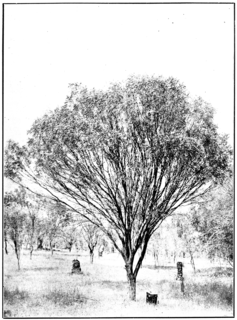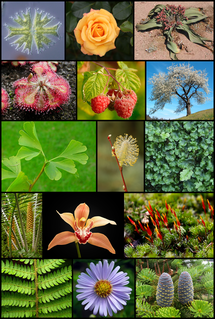
Magnolia is a large genus of about 210 flowering plant species in the subfamily Magnolioideae of the family Magnoliaceae. It is named after French botanist Pierre Magnol.

Buxus is a genus of about 70 species in the family Buxaceae. Common names include box or boxwood.

Camptotheca is a genus of medium-sized deciduous trees growing to 20 metres (66 ft) tall, native to southern China and Tibet. The genus is usually included in the tupelo family Nyssaceae, but sometimes included in the dogwood family Cornaceae.

The blood banana, is a variety of the wild banana Musa acuminata native to Sumatra, Indonesia. The blood banana is an ornamental plant, named for the dark red patches on its leaves, though its small-seeded fruits are also edible.

Acacia acuminata, known as mangart and jam, is a tree in the family Fabaceae. Endemic to Western Australia, it occurs throughout the south west of the State. It is common in the Wheatbelt, and also extends into the semi-arid interior.

Brassaiopsis is a genus of shrubs of family Araliaceae. There are about 45 species, distributed in Asia from the Himalaya through China, Vietnam, Thailand to Indonesia.

Aralioideae is a subfamily of flowering plants contains around 50 recognized genera. These include the genus Panax, to which ginseng belongs. Other notable species are the Angelica-tree, the devil's club, or common ivy.
Brassaiopsis kwangsiensis is a species of plant in the family Araliaceae. It is endemic to China.
Brassaiopsis minor is a species of plant in the family Araliaceae. It is a tree endemic to Peninsular Malaysia. It is threatened by habitat loss.
Brassaiopsis simplex is a species of plant in the family Araliaceae. It is a tree endemic to Peninsular Malaysia. It is threatened by habitat loss.
Euaraliopsis dumicola is a species of flowering plant in the family Araliaceae. It is endemic to China. The flower is stiff and persistent with stout pedicels 5-8 millimeters long and bracts subtending flowers 4-10 millimeters. The flowers grow in an inflorescent pseudo-lateral pattern borne on woody stems below leaves.
Goniostemma is a genus of plant in family Asclepiadaceae, first described as a genus in 1834. It contains two known species, one native to China, the other to India and Bangladesh.
- Goniostemma acuminataWight - India, Bangladesh
- Goniostemma punctatumTsiang & P.T. Li - Yunnan

Grand Nain bananas are banana cultivars of Musa acuminata. It is one of the most commonly cultivated bananas and a source of commercial Cavendish bananas. It is also known as the Chiquita banana, because it is the main product of Chiquita Brands International.

Musa acuminata is a species of banana native to Southeast Asia. Many of the modern edible dessert bananas are from this species, although some are hybrids with Musa balbisiana. First cultivated by humans around 10 kya, it is one of the early examples of domesticated plants.
Brassaiopsis glomerulata is a species of shrub in the family Araliaceae. Extracts are sold as bodybuilding supplements based on the assumption that aromatase inhibitors present in the plant might have effects in humans.

Cleghornia is a genus of plants in the dogbane family; its various species are distributed in Borneo, China, Laos, Malaysia, Sri Lanka, Thailand, and Vietnam.
Ottelia acuminata, is a plant species endemic to Southern China.
Anogeissus acuminata has been called axlewood or the buttontree in English: it is a synonym of Terminalia phillyreifolia. A medium-sized tree found in both primary and secondary tropical and sub-tropical forests, it may be one of the dominant species of deciduous forests of Vietnam; it is recorded from the rest of Indochina, Bangladesh, India, Myanmar and Yunnan in China. In Yunnan it is found in rocky limestone areas, near sea level to 700 m.
Brassaiopsis elegans is a species of shrub in the family Araliaceae.













